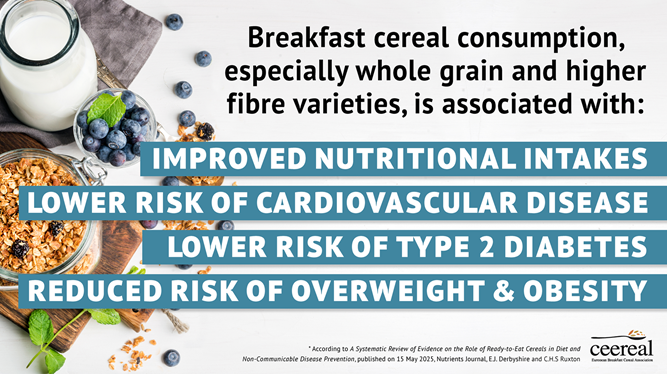Non-communicable diseases (NCDs), including diabetes and cardiovascular diseases, remain one of the greatest public health challenges in Europe, with complex and multiple risk factors. They cause 80% of deaths in the EU and account for up to 10% of total healthcare spending, while reducing the quality of life for millions. Tackling the root causes, such as poor dietary habits, rising obesity rates and evolution of lifestyles, requires coordinated efforts across sectors, including the food industry, healthcare and policymakers.
The EU has already set ambitious goals - from the Farm to Fork Strategy to the EU’s Beating Cancer Plan - aimed at enhancing public health and promoting sustainable food systems. While addressing these complex challenges requires a multifaceted approach, breakfast cereals can serve as a convenient, affordable and nutrient-rich component within a balanced diet, contributing to improved nutritional intakes and supporting broader health outcomes.
A major new systematic review, published in Nutrients, highlights that breakfast cereal consumption - particularly whole-grain and higher fibre breakfast cereals - is associated with improved nutritional intakes, a lower risk of cardiovascular disease as well as type 2 diabetes in adults, and a reduced risk of overweight and obesity across all age groups, including children, adolescents and adults, making them a valuable addition to the diets of individuals across all age groups.

The evidence is compelling. Breakfast cereal consumption delivers meaningful amounts of essential nutrients like fibre, vitamins and minerals. Iron deficiency is one of the most common micronutrient deficiencies worldwide, posing the greatest risk to women of childbearing age, children and the elderly. The study shows that breakfast cereals provide 7-24% of daily iron intakes for children, adolescents and adults across France, the UK, Ireland, the US and Canada. We see similar contribution levels to daily intakes of fibre, which is crucial for maintaining digestive health and preventing chronic diseases, with breakfast cereals providing 7-18% of daily dietary fibre in the UK, Ireland, the US and Canada.
Fortification further enhances the nutritional value of breakfast cereals. In 2023, 65% of cereals sold by CEEREAL members were fortified, totalling 10.6 billion servings across Europe. In the UK, cereals provide, on average, 20% of the daily vitamin D intake for children and adolescents. The breakfast cereal industry is committed to continuous improvement, responding to the evolving needs of consumers. Since 2015, manufacturers have increased whole-grain content by 38.6%, increased fibre by 12.3% and reduced sugar by 9% through reformulation.
Regular consumption has been linked to a 22% lower risk of type 2 diabetes, as well as a reduced risk of obesity. Additionally, the data shows that regular breakfast cereal consumption is associated with a 10% lower risk of coronary heart disease and an 8% lower risk of cardiovascular disease. Whole-grain cereals show even stronger benefits, with a 28% lower risk of coronary heart disease and a 26% lower risk of cardiovascular disease.
In conclusion, the evidence supports the notion that breakfast cereals are a nutrient-rich option that can significantly contribute to a balanced diet. As we confront the pressing public health challenges of our time, it is imperative for EU policymakers, industry stakeholders, and consumers to unite in promoting nutritious breakfast options, including breakfast cereals. By doing so, we can work towards a healthier and more sustainable future for all.
Sign up to The Parliament's weekly newsletter
Every Friday our editorial team goes behind the headlines to offer insight and analysis on the key stories driving the EU agenda. Subscribe for free here.